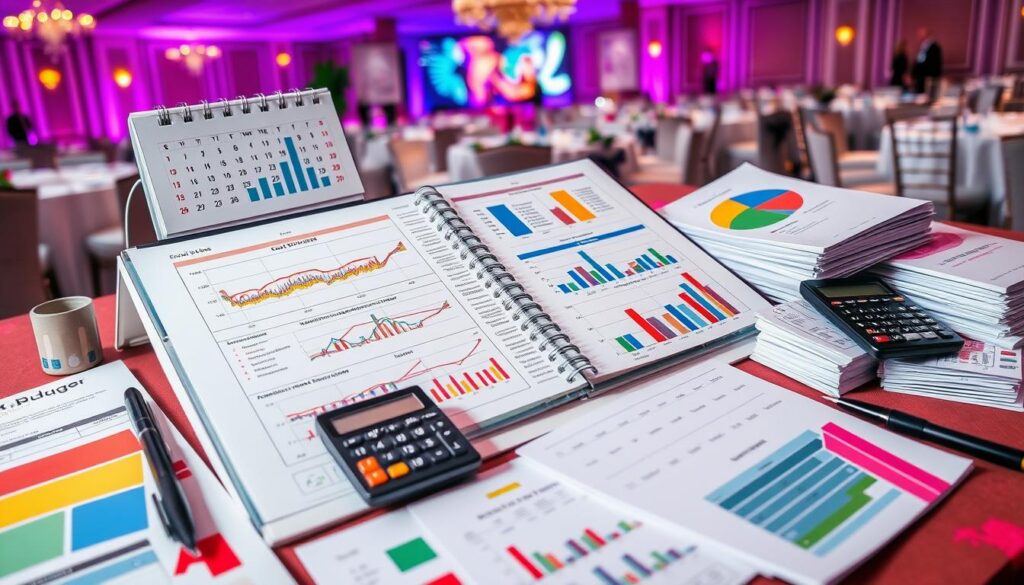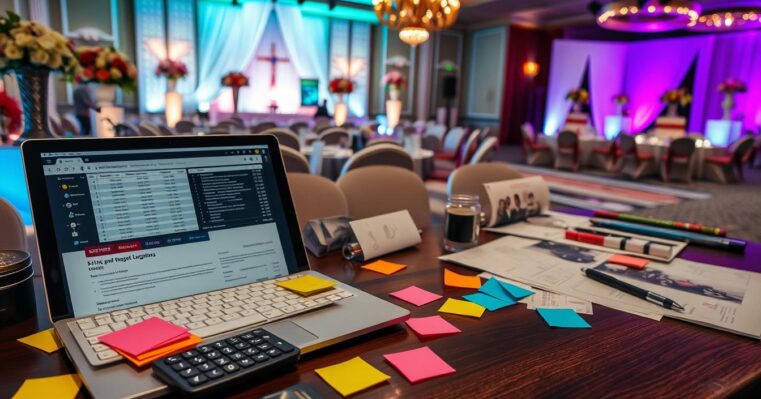As an event organizer, you know that budgeting is key to success1. With costs going up, 46.3% of event pros face big challenges2. A solid budget is vital for your event's success. It's what turns a flop into a hit, making your event unforgettable without breaking the bank.
Look for ways to make more money, like selling tickets and exhibitor fees1. Also, track your money by subtracting expenses from income1. Knowing how to budget helps you overcome the rising costs in the event world.
Key Takeaways
- Event budgeting is essential for successful event outcomes1.
- Rising costs are a major obstacle for 46.3% of event professionals2.
- Exploring multiple revenue streams can increase event revenue1.
- Calculating cash flows helps in making informed decisions1.
- A contingency fund should be around 10-15% of the total budget3.
- Tracking spending in real-time can help identify potential overspending early on3.
Understanding the Importance of Event Budgeting
When planning an event, budgeting for event management is key. It gives a clear plan, boosts efficiency, and helps decide how to use resources. Good event budget allocation keeps the team on track and lets them watch spending4.
A smart budget stops overspending, helps make better choices, and makes stakeholders trust you more. It's vital to spend wisely on things like venue, food, entertainment, and marketing5.
Why Budgeting Matters
Budgeting is important because it lets event planners control money, handle risks, and make sure they get a good return on investment (ROI). A clear budget helps find ways to save money, keeping the event affordable4.
Common Budgeting Mistakes to Avoid
Don't guess costs, overlook hidden fees, or skip a backup fund. Set aside 5-10% of your budget for surprises4. Also, keep an eye on spending to spot and fix any issues fast4.

Knowing how to budget and avoid common errors helps event planners make their events profitable and well-run5.
| Budget Category | Recommended Allocation |
|---|---|
| Venue | 20-30% |
| Catering | 15-25% |
| Entertainment | 10-20% |
| Marketing | 10-20% |
| Contingency | 5-10% |
Setting Your Event Goals
As an event organizer, setting clear goals is key to success. This means controlling costs and managing expenses well. By matching your budget with your event goals, you can make smart choices about where to spend your money6.
To know if your event is a success, look at a few important things:
- How happy attendees are, based on surveys and feedback7
- How much money you make, from ticket sales and sponsorships6
- How well your brand is known, through social media and mentions7
Aligning Budget with Objectives
Setting SMART goals helps guide your event's success. You can track things like a 20% rise in ticket sales7 and a 10% boost in registrations7. This ensures your event is on the right path.

Identifying Key Metrics for Success
Finding the right metrics to track is crucial. Look at things like cost per customer6, the number of leads6, and social media mentions7. By watching these, you can make better choices to reach your goals.
Creating an Event Budget Template
To manage your event budget well, you need a detailed spreadsheet. It should list all expected costs, income, and financial figures. This acts as a financial guide for your event, keeping you on track financially.
When making a budget template, it's key to list all stakeholders clearly. This includes exhibitors, sponsors, participants, staff, and more. It helps you see where money comes from and where it goes8.
A good budget template should have fixed and variable costs, income, and profit/loss forecasts. Online tools, like the 11 Free Event Budget Templates, can help you start9. These templates have features like automatic calculations and data visualization.
When setting up your budget, remember to save 10-20% for unexpected costs. Keeping detailed records of event expenses is also crucial9. With a solid spreadsheet and these tips, you can plan your event's finances effectively.

Tools like ClickUp's Event Budget Template can also be useful. They help you manage resources, track expenses, and analyze costs. This makes it easier to show event costs to stakeholders for approval9.
Estimating Costs Accurately
As an event organizer, it's key to estimate costs well for good event budget tracking and event cost control. You should get quotes from vendors, do research, and use past data to guess costs10. Think about both fixed costs, like venue fees, and variable costs, like food per person10.
Knowing what your event aims to achieve is vital for accurate cost guessing. You need to pick important success metrics and match your budget to them11. Also, finding ways to save, like on hotel and meeting room costs, can help manage your event cost control11.
Don't forget to include hidden costs like insurance and permits in your estimates10. A detailed breakdown of costs, using a bottom-up method, can make your estimates more accurate12. With the right tools and steps, you can make a budget that helps your event succeed.
![]()
- Travel and accommodation costs
- Food and beverage expenses
- Staff compensation and logistics
- Facility expenses, including venue acquisition costs and hidden costs
- Marketing and public relations costs
By carefully looking at these factors and using the right methods, you can make a solid event budget tracking and event cost control plan101112.
Categorizing Your Event Expenses
Managing event expenses means knowing the different costs involved. Fixed costs, like venue rental and insurance, don't change with guest numbers13. Variable costs, like food and staff, do change with guest numbers13. By sorting your expenses into fixed and variable, you can plan your budget better and decide where to spend.
A good event budget should cover key areas like venue, food, marketing, staff, and tech13. Breaking down each area into smaller parts helps you spot where to cut costs. For instance, venue costs include rental, utilities, and equipment14. Knowing what each part costs helps you budget better and avoid surprises.
Good budgeting is key to a successful event. By focusing on what's important and spending wisely, you can give your guests a great time without breaking the bank15. Don't forget to save for unexpected costs, like equipment failure or last-minute changes14.
| Category | Fixed Costs | Variable Costs |
|---|---|---|
| Venue | Rental fees, utilities | Equipment rental, catering |
| Marketing | Advertising, promotional materials | Staffing, event promotion |

Prioritizing Your Expenditures
As an event organizer, you must focus on what matters most to make your budget work. Look at each part of your budget to see how it affects the event16. PCMA says spending 55% on food, audiovisual, and entertainment can really make a difference16.
To make the most of your budget, try these tips:
- Identify core objectives: Find out what's really important like venue, food, and key equipment17.
- Get multiple quotes: Look for the best deals on services and supplies17.
- Consider alternatives: Think outside the box for ways to save without sacrificing quality17.
Using these strategies will help you manage your budget well18. Always think about what your guests want to make sure they have a great time16.
Good event planning means looking at all costs, from venue to marketing16. By focusing on what's important and making smart choices, you can throw a memorable event that fits your budget.

| Expense Category | Recommended Allocation |
|---|---|
| Venue Rental | 20-30% |
| Catering | 20-30% |
| Entertainment | 10-20% |
Finding Sources of Funding
As an event organizer, you must look at different ways to make money. Budgeting is key to finding these sources and using them wisely. It's about researching costs, talking to vendors, and keeping an eye on spending19. You can look into making money from ads, food sales, renting booths, fees, ticket sales, and sponsorships20.
To make more money, try these ideas:
- Offer sponsorship deals to companies, showing them the perks of being part of your event20.
- Set up ticket prices that change, like tiered or early bird deals21.
- Look into selling merchandise, VIP packages, or making money after the event19.
By focusing on what's important and using resources well, you can build a strong financial base for your event. Keep track of spending and watch your money flow closely. Also, don't be afraid to talk down prices with vendors21. With good planning and a solid budget, your event can be a success.

Vendor Management and Negotiation Tips
As an event organizer, managing costs is key to success. Building strong vendor relationships and negotiation skills are crucial. Researching vendors, defining what you need, and asking for quotes can help save money without losing quality22. It's also important to see the value vendors bring, leading to better terms and future collaborations23.
Long-term relationships with vendors can get you better deals and discounts. Timing is everything in negotiations, with off-peak seasons and early bookings helping your cause23. Being open to vendors' ideas can also stretch your budget without sacrificing quality23.
Effective Negotiation Techniques
To negotiate well, prepare your points, listen actively, speak clearly, and be friendly yet assertive22. Knowing your budget is essential for good negotiations, saving time and leading to better talks23. These tips help you build strong vendor relationships and control costs, leading to a successful event.
Some key negotiation strategies include:
- Researching potential vendors
- Defining non-negotiables and flexibilities
- Requesting quotes from selected vendors
- Being creative and open to vendors' ideas
- Building long-term relationships with vendors
By using these strategies, you can manage event expenses well and reach your goals2223.

Creating a Contingency Fund
As an event organizer, it's crucial to have a contingency fund in your budget. This fund helps cover unexpected costs or emergencies. It acts as a financial safety net, keeping your event on track even when things go wrong.
Statistical data shows that contingency management is key in project management24. It involves estimating, justifying, and managing contingency reserves. This ensures you're ready for any surprises.
The size of your contingency fund depends on your event's size, complexity, and risk level25. A good event financial plan includes a contingency fund. This way, you're prepared for any unexpected expenses.
When setting up your contingency fund, consider a few things:
- Changes to owners or stakeholders
- Scope creep
- Poor project management
- Unrealistic risk assessment
Having a contingency fund in your budget makes your event financial planning solid24. Keep your event budget spreadsheet updated with real costs. This gives you a clear picture of your budget's performance as you plan25.
Tracking Your Budget Progress
As an event organizer, keeping an eye on your budget is key. It helps you stay in control of your finances. This way, you can spot any extra costs or ways to save money right away. This is why event budget tracking and event financial planning are so important.
It's crucial to regularly check your budget to meet your financial goals. During these checks, look at your spending, find ways to save, and adjust as needed. For example, 43% of your costs might go to marketing and promotion26, and 32% to speaker fees26. Knowing where your money goes helps you make smart choices about how to spend it.
Some important things to look at during budget reviews include:
- Managing vendors and negotiating prices
- Finding ways to save money
- Looking at ticket sales and other income
By regularly checking your budget and making changes, you can keep your event within budget. This is crucial, as 90% of event planners faced budget issues in 201827. With good event budget tracking and event financial planning, you can avoid common problems and make your event financially successful.
![]()
Being flexible and proactive is essential for a healthy budget. By keeping a close eye on your finances and making timely adjustments, you can ensure your event's success. This way, you can reach your financial goals.
| Category | Percentage of Total Costs |
|---|---|
| Marketing and Promotion | 43% |
| Speaker and Talent Fees | 32% |
| Printed Materials | 29% |
Utilizing Technology for Budget Management
Managing your event budget is key to a successful event. Event management software like EventMobi can make this easier28. It offers tools for event apps, virtual events, and hybrid events, helping with budget tracking29.
Event management software has features like budgeting tools and vendor management. These help you track costs in real-time29. Mobile apps also let you manage your budget anywhere, anytime28.
Using technology for budget management has many benefits:
- It makes tracking more accurate and reduces mistakes
- It gives you better control over your budget
- It saves time and boosts productivity
- It helps you make better decisions with data
Technology makes budget management more efficient and effective29. It saves time, cuts costs, and boosts your event's success28.
Reporting Your Budget to Stakeholders
As an event organizer, you know how vital event financial planning and Event Organizer Budgeting are. Reporting your budget to stakeholders is key to keeping things transparent and building trust. A detailed budget report that shows important financial numbers and forecasts is essential30.
A good budget report should give a clear financial plan overview. It should also detail expected costs and income sources. This helps stakeholders grasp your event financial planning approach and make smart choices31.
When sharing your financial status, use simple language. Avoid complex terms and focus on main performance indicators. Visual tools like charts and graphs can make your points clearer and more interesting31.
Important things to think about when reporting your budget include:
- Company size and event scope
- Event goal and location
- Basic event costs, such as venue, food, and labor
- Event promotion and marketing expenses
By considering these points and providing a clear budget report, you can share your financial status well. This ensures your event's success30.
Post-Event Budget Analysis
After the event ends, it's time to review the budget. This step helps you check if your budget was right, find where you spent too much or saved money, and learn for next time32. By looking at the financial data, you understand how your event did and can improve your budgeting for the future.
Looking at unexpected costs or savings is key in the analysis33. Maybe you got better deals with vendors or found ways to save money. Or, you might have faced extra costs that changed your budget. Knowing these changes helps you improve your budgeting for the next event.
It's also important to think about the big lessons from your budgeting33. What worked well, and what didn't? How can you use technology to make budgeting easier? Using these lessons, you can better manage costs and give your attendees a great experience.
Event budgeting is a never-ending learning journey33. By always trying to get better, you can improve your budgeting skills and make your events successful. If you need help or have questions about budgeting, contact our team at or call us at. We're ready to help you with event finance and reach your goals.
FAQ
Why is budgeting important for event organizers?
Budgeting is key to success in event planning. It helps avoid overspending and makes better decisions. It also boosts confidence among stakeholders.
It gives control over finances, manages risks, and aims for a positive return on investment.
What are some common budgeting mistakes that event organizers should avoid?
Mistakes include underestimating costs and forgetting hidden expenses. Not having a contingency fund is another error. Avoiding these mistakes leads to a more realistic budget.
How can event organizers align their budget with their event objectives?
Aligning the budget with event goals is essential. It ensures financial decisions align with the vision. Identifying key success metrics helps make strategic decisions.
What are the essential elements that should be included in an event budget template?
A good budget template includes fixed and variable costs, revenue, and profit projections. Digital tools for tracking and collaborative budgeting are also helpful.
How can event organizers accurately estimate the costs associated with their event?
Accurate cost estimation requires researching and getting quotes. It's important to include hidden expenses like insurance and permits. This avoids surprises later.
What are the key expense categories that event organizers should consider when budgeting?
Key categories include venue, catering, marketing, staffing, and technology. Breaking down each category helps identify areas for adjustments.
How can event organizers prioritize their expenditures to maximize the impact of their budget?
Evaluating the value of each expense is crucial. Understanding audience expectations can also help reduce costs without lowering quality.
What are some alternative funding sources beyond ticket sales that event organizers can explore?
Exploring sponsorships and other revenue streams like merchandise sales is beneficial. Diversifying income can stabilize the event's finances.
How can event organizers build strong relationships with vendors and negotiate better rates?
Good communication, timely payments, and long-term partnerships are essential. Negotiating techniques like volume discounts can secure better terms.
Why is it important to include a contingency fund in the event budget?
A contingency fund is a financial safety net. It helps handle unexpected expenses or changes without affecting the budget. Allocating a suitable amount is based on event size and risk.
How can event organizers effectively track and manage their budget throughout the planning process?
Regular budget reviews and making informed decisions are crucial. Flexibility and proactive management help avoid surprises as the event approaches.
How can technology help streamline the budget management process for event organizers?
Budgeting software and mobile apps save time and reduce errors. They provide insights through data analysis and reporting. This enhances the budgeting process.
How can event organizers effectively communicate their budget and financial status to stakeholders?
A clear budget report with key metrics and projections is essential. Visual aids and performance indicators help maintain transparency and trust with stakeholders.
Source Links
- https://iccbelfast.com/blogs/event-budgeting-guide
- https://www.eventmobi.com/blog/event-budget-basics/
- https://www.momencio.com/budgeting-for-events-tips-strategies/
- https://www.eventsair.com/blog/event-budgeting
- https://fastercapital.com/topics/understanding-the-importance-of-event-budgeting.html
- https://www.socialtables.com/blog/event-planning/defining-event-goals/
- https://www.airmeet.com/hub/blog/virtual-event-goals-objectives-planning/
- https://spotme.com/blog/event-budget-template/
- https://clickup.com/blog/event-budget-templates/
- https://www.travelperk.com/guides/event-budget/
- https://stova.io/event-budget/
- https://activecollab.com/blog/project-management/cost-estimation-and-budgeting
- https://www.eventbrite.com/resources/budgets/expense-categories/
- https://liveforce.co/event-cost-breakdown-budgeting-tips/
- https://www.airmeet.com/hub/blog/event-budget-expenses/
- https://www.linkedin.com/advice/0/youre-juggling-expenses-event-how-do-you-decide-9q1cc
- https://www.linkedin.com/advice/3/youre-planning-upcoming-event-conflicting-needs-c0fsf
- https://inevent.com/blog/events/budgeting-brilliance-strategies-for-effective-event-organization-on-any-budget.html
- https://eventify.io/blog/event-budget
- https://www.eventbrite.co.uk/blog/8-ways-to-finance-your-event-idea-ds00/
- https://www.linkedin.com/pulse/budgeting-success-tips-tricks-effective-event-financial-management
- https://www.eventbrite.com/blog/negotiating-contracts-with-vendors/
- https://www.linkedin.com/advice/1/youre-managing-event-tight-budget-how-can-you-8onte
- https://www.smartsheet.com/content/project-budget-contingency?srsltid=AfmBOooaia3VEN1RgohrGpxIhWbtP-q7nSE112npFZdB7XErcnXwj-DG
- https://www.perfectvenue.com/post/event-management-budget
- https://www.eventtia.com/en/blog/the-complete-guide-to-creating-a-budget-for-an-event
- https://www.eventx.io/blog/event-budget-planning-a-comprehensive-guide-for-organizers-and-companies
- https://corporatemagic.com/event-budgeting-objectives-technology-analysis/
- https://www.linkedin.com/advice/3/how-can-you-simplify-your-budgeting-negotiation-tasks
- https://blog.eventsmart.com/2023/12/01/event-planning-budget/
- https://www.cvent.com/en/blog/events/event-budgeting-guide
- https://www.vfairs.com/blog/event-budget/
- https://www.qwick.com/blog/event-budget-expenses-template





